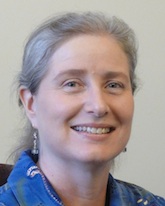Lisa G. Aspinwall Ph.D., is associate professor of psychology at the University of Utah, US, and a member of the Huntsman Cancer Institute. Her research program examines self-regulatory processes and future-oriented thinking (proactive coping, optimism, prevention) as people seek to anticipate, prevent, understand, and manage important negative outcomes, especially in the domain of health. She has studied such questions in a wide range of topic areas, including psychosocial adjustment to cancer and most recently, genetic testing for familial cancer.
Dr. Aspinwall received her Ph.D. from UCLA in 1991 and taught at the University of Maryland until moving to the University of Utah in 2000. Aspinwall is a Fellow of both the American Psychological Association and the Association for Psychological Science.
She is the recipient of grants from the National Science Foundation and National Cancer Institute. In 2000, she received a Templeton Positive Psychology Prize. In 2003, she and Ursula Staudinger co-edited an award-winning volume, A psychology of human strengths: Fundamental questions and future directions for a positive psychology (APA Books).
Check out the following Psychology CE Courses based on listening to Shrink Rap Radio interviews:
Jungian Psychotherapy Part 1 (6 CEUs)
Jungian Psychotherapy Part 2 (7 CEUs)
Jungian Psychotherapy Part 3 (7 CEUs)
Jungian Psychotherapy Part 4 (6 CEUs)
Jungian Psychotherapy discounted Package of the Three Above (20 CEUs)
Wisdom of The Dream (4 CEUs)
Positive Psychology (6 CEUs)
Get our iPhone/Android app!
A psychology podcast by David Van Nuys, Ph.D.
Podcast: Play in new window | Download
Subscribe: Apple Podcasts | RSS

Good to see Positive Psychology is growing up a little.
I hope they catch up to gestalt one day – that the unit of analysis is the ‘organism-environment field’ (I’d prefer to say “the person in their situation”).
Mr Coyne did mention that his focus was on cancer and that it didn’t apply to heart attacks where people can do stuff to influence outcome.
hi…I have been looking the World Wide Web for this information and I want to thank you for this post. It’s not easy to find such perfectly written information on this topic. Great Work!
I believe that positive thinking help get good health! Positive psychology helps!
Great interview! Awesome information. Cleaning up public beliefs through research and studies is truly a contribution to improve public knowledge.
A crucial point or notion that concerns many people, basically everybody who sees a doctor and gets a diagnosis, is what medical professionals say and the beliefs this is based on. I was stunned by the research result presented by Dr. Aspinwall that people in a bad mood and whatever this may include, get subsequently less help.
Also, the role of beliefs and belief systems that our thinking collectively and individually is based upon, was discussed in a very enlightening way. I think that must be an interesting field for research or maybe it already is?
On a more personal note, I was very sorry to hear about the illness of your son. I hope things are going well for him and the family. Glad to hear that he found what sounded like his vocation!
Outstanding interview with an outstanding guest! Thank you very much,
Lisa